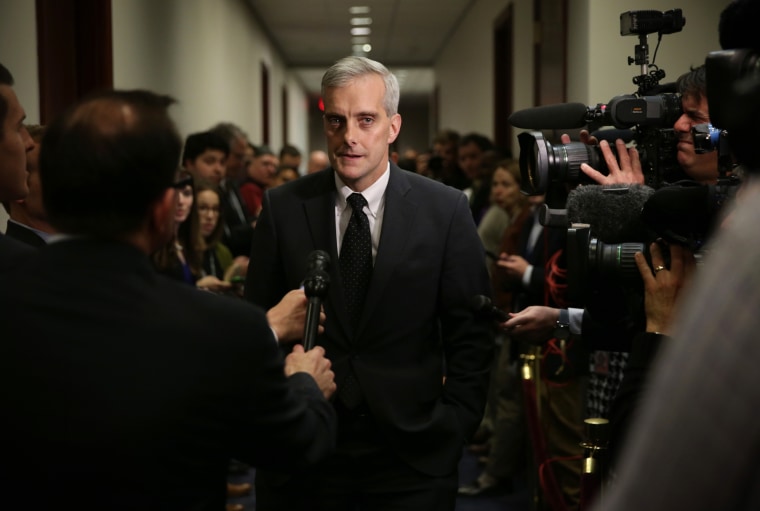President Barack Obama is taking the fight against ISIS “very, very seriously” and Congress should not “take a pass on the issue,” White House Chief of Staff Denis McDonough said on Sunday.
Obama submitted an Authorization for the Use of Military Force (AUMF) request to Congress this past Wednesday, sparking debate among lawmakers over the president’s military plan and the scope of his war powers in fighting terrorist group ISIS. McDonough warned on CBS’s “Face the Nation” that Congress should not shelve the debate.
RELATED: Obama asks for new war powers: ISIS is ‘going to lose’
“What they shouldn't do this time is what they did in 2013 when they took a pass on this issue,” McDonough said. “It's very important in questions of war and peace for Congress to be heard. The president has given them a roadmap to follow. They can take that or they can come up with something else. But they should not take a pass on this important issue.”
The new authorization would leave in place the broadly worded resolution approved after the 9/11 attacks. It would, however, supplant the measure that enabled the Iraq war in 2002.
The majority of Americans support the Obama’s proposed plan to fight ISIS, according to an exclusive NBC News/Marist poll conducted after the president sent the AUMF to Congress this week. However, public confidence in the plan was divided, as were opinions on what effect starting a war might have on Obama’s legacy.
Republicans are already criticizing the plan, with many, including House Speaker John Boehner, saying the AUMF doesn’t go far enough in providing the president with the power needed to fight ISIS. The argument represents an about-face for the party that has long argued on other issues that the president goes too far in exercising his executive authority — going so far as to consider suing him for perceived overreach on the Affordable Care Act and immigration.
Sen. John McCain said on NBC’s “Meet the Press” on Sunday that the president’s plan was “convoluted” and, while the AUMF is worth debating in Congress, “the president hasn’t come forward with a plan or a strategy for us to have success.”
RELATED: Obama doubles down on perpetual war
"In his proposal, [Obama] left out [Syrian President] Bashar al-Assad, which is really amazing in that we are training young Syrians to go in and fight against Bashar al-Assad,” said McCain, who is chairman of the Senate Foreign Relations Committee. He added that the plan was “an uncertain trumpet” but that Congress should not restrain the president from taking action.
“Congress has the power of the purse,” McCain said. “If we don’t like what the commander in chief is doing, we can cut off his funds for doing so.”
Boehner also piled on criticism for the plan. “We need a robust strategy to attack ISIL and no one has seen one yet,” he told Fox News on Sunday. He added that he doesn’t “believe the authorization the president has asked for will give him the power to defeat ISIL,” an alternative acronym also referring to the Islamic State or ISIS.
McDonough disagreed and championed the progress already made by the United States’ ongoing fight, known as Operation Inherent Resolve, against ISIS. “We've now ... conducted more than 2,400 strikes against ISIL targets in Iraq and in Syria,” he said. “Those strikes are having a very dramatic impact. We've seen ISIS's progress blunted in Iraq. We're making good progress in Syria.”
U.S. and coalition forces, which include Jordan, Saudi Arabia, Bahrain and the United Arab Emirates, reported the completion of three airstrikes in Syria and eight in Iraq this weekend.
“My Administration’s draft AUMF would not authorize long‑term, large-scale ground combat operations like those our Nation conducted in Iraq and Afghanistan,” Obama wrote in a letter sent to Congress on Wednesday. “Local forces, rather than U.S. military forces, should be deployed to conduct such operations. The authorization I propose would provide the flexibility to conduct ground combat operations in other, more limited circumstances, such as rescue operations involving U.S. or coalition personnel or the use of special operations forces to take military action against ISIL leadership.”
